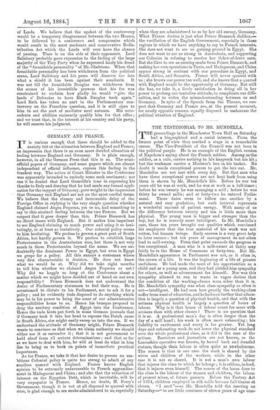GERMANY AND FRANCE.
IT is curious enough that there should be added to the anxiety felt at the alienation between England and France, an impression that there is an even more decided alienation of feeling between England and Germany. It is plain enough, however, in all the German Press that this is so. The semi- official papers of Germany, and some papers which are almost independent of official influence, express this feeling in the frankest way. The action of Count Munster in the Conference was apparently intended to embody some such sentiment ; nor can it be denied that Lord Granville's tone in expressing his thanks to Italy and denying that he had made any formal appli- cation for the support of Germany, gave weight to the impression that Germany and England are not on the most cordial terms. We believe that the clumsy and inexcusable delay of the Foreign Office in replying to the very simple question whether England claimed Angra Pequena, yes or no, had something to say to this strained feeling between the two Powers. But we suspect that it goes deeper than this. Prince Bismarck has no direct issues with England. But it makes him impatient to see England claiming so much power and using it so hesi- tatingly, or at least so tentatively. Our colonial policy seems to him hesitating. We profess to govern a great part of South Africa, but hardly govern it. We profess to establish large Protectorates in the Australasian seas, but there is not very much in these Protectorates beyond the name. We are un- doubtedly the dominant Power in Egypt, but even in Egypt we grope for a policy. All this annoys a statesman whose very first characteristic is decision. He does not know what we would be at. Why did we take eight months to tell him whether we claimed Angra Pequena or not ? Why did we haggle so long at the Conference about a matter which we might have decided out of hand on our own responsibility ? Prince Bismarck does not understand the desire of Parliamentary statesmen to feel their way. He is accustomed to dictate to his Parliament, not to ask it for a policy ; and he evidently feels disposed to do anything which may be in his power to bring the sense of our administrative responsibilities home to us. Hence his brusque proposal to drag the sanitary condition of Egypt into the Conference. Hence the rude hints put forth in some German journals that if Germany took it into her head to espouse the Dutch cause in South Africa, she might easily sweep us into the sea. If we understand the attitude of Germany aright, Prince Bismarck wants to convince us that when we claim authority we should either use it or surrender it ; that it is not government to hold aloof from all serious determinations ; and that so far as we have to deal with him, he will at least do what in him lies to bring us to book on points of immediate practical importance. As for France, we take it that her desire to pursue an am- bitions Colonial policy is quite too strong to admit of any needless quarrel with England. France knows English opinion to be extremely unfavourable to French aggrandise- ment in Madagascar and China ; and also that the reduction of interest on the Egyptian Debt, which is inevitable, will be very unpopular in France. Hence, no doubt, M. Ferry's Government, though it is not at all disposed to quarrel with ours, is glad enough to see snubs administered to us, especially when they are administered to us by her old enemy, Germany. What France desires is just what Prince Bismarck dislikes,— the vacillation of the English Government, especially in those regions in which we have anything to say to French interests. She does not want to see us gaining ground in Egypt. She does not want to see us strong in Australasia, and supporting our Colonies in refusing to receive her ticket-of-leave men. But she likes to see us earning snubs from Prince Bismarck, and making her own operations in Tunis, and Madagascar, and China appear strong in contrast with our procedure in Egypt, and South Africa, and Sumatra. France will never quarrel with us ; she knows our power too well, and she knows that a quarrel with England would be the opportunity of Germany. But still she has, we take it, a lively satisfaction in doing all in her power to prolong our tentative attitude, to complicate our diffi- culties, and to widen the misunderstanding between us and. Germany. In spite of the Speech from the Throne, we sus- pect that Germany and France are, at the present moment, for nearly opposite reasons, equally disposed to embarrass the political situation of England.


































 Previous page
Previous page